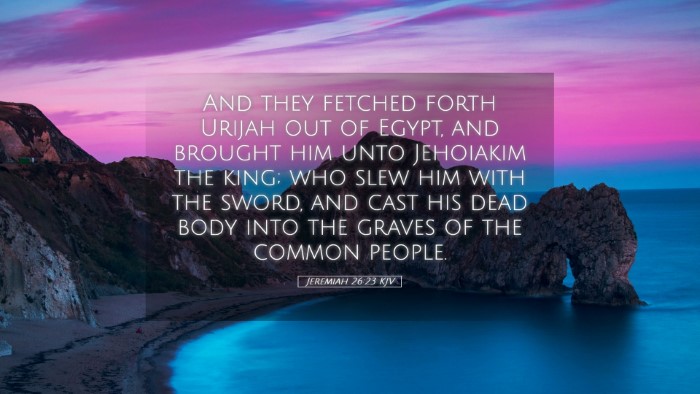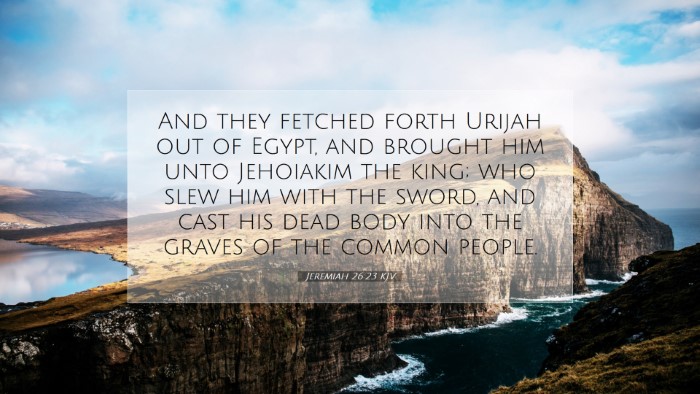Commentary on Jeremiah 26:23
Bible Verse: "And they fetched forth Urijah out of Egypt, and brought him unto Jehoiakim the king; who slew him with the sword, and cast his dead body into the graves of the common people."
Introduction
This passage from the book of Jeremiah illustrates the serious consequences faced by those who boldly proclaim God's message of judgment. The account of Urijah serves as a sobering reminder of the dangers of prophetic ministry in a time of spiritual decline. As we delve into the insights from various public domain commentaries, we will explore the historical context, theological implications, and practical applications of this verse.
Historical Context
Matthew Henry emphasizes that this episode highlights the perilous environment in which prophets operated during the reign of Jehoiakim. Urijah, like Jeremiah, prophesied against Jerusalem and foretold its impending destruction, resulting in a fierce backlash from the rulers. Jehoiakim's violent reaction is emblematic of the broader hostility towards divine messages during this turbulent period.
Albert Barnes elaborates on the circumstances that led to Urijah's persecution. He notes that Urijah's ministry took place shortly before the Babylonian exile, a time when God's people were particularly resistant to His word. The king, threatened by the prophet's forecast, sought to eliminate any dissenting voices, showcasing the desperate measures leaders will take to maintain control and silence opposition.
Theological Implications
The execution of Urijah raises vital theological questions regarding the nature of God’s sovereignty and the cost of discipleship. According to Adam Clarke, one of the key lessons from this verse is the reminder that the integrity of prophetic ministry often leads to personal sacrifice. The willingness of Urijah to speak God’s truth, despite the dire consequences, underscores a profound commitment to divine calling.
Matthew Henry also points out that this passage illustrates the age-old struggle between the truth of God's message and the rejection by those in power. It serves as a poignant reminder of the manifold ways in which God's messengers have historically faced hardship for their faithfulness. This can be seen as an echo of Christ's own suffering, linking it to the prophetic tradition.
Character Study: Urijah
Urijah is depicted as a figure of remarkable courage and faithfulness. Albert Barnes highlights how, despite the danger, Urijah fled to Egypt for refuge, only to be ultimately captured and killed. This highlights the futility of human attempts to escape God's plans. It serves as a cautionary tale for believers today to remain committed to their divine mission, despite circumstances that may appear dire.
Implications for Today's Believers
- Boldness in Proclamation: This passage calls for a renewed commitment among pastors and congregants to boldly proclaim God's Word, even against societal pressures and potential repercussions.
- Understanding Persecution: Recognizing the reality of persecution that often accompanies truth-telling can prepare believers to endure trials for their faith.
- Trust in God's Sovereignty: Despite Urijah's tragic end, there's a deeper solace found in the belief that God remains sovereign over the events of history and the lives of His messengers.
Conclusion
Jeremiah 26:23 encapsulates a poignant moment in the prophetic narrative that continues to resonate with modern readers. The loss of Urijah serves as both a warning and an encouragement, reminding us of the high cost of discipleship amid opposition. As we reflect on these insights, may we commit to uphold the truths of the Gospel, come what may, honoring those who have stood firm in faith like Urijah.
It is through studying such passages and their commentaries that believers can gain a fuller understanding of the implications of their faith in both historical and contemporary contexts.


